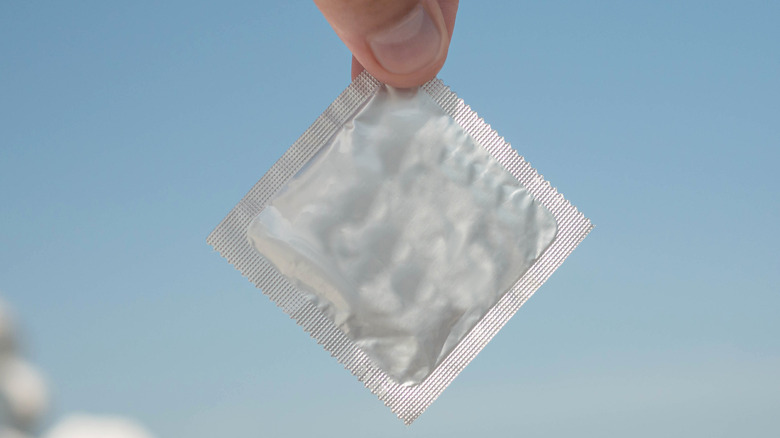Using Condoms Can Have An Unexpected Effect On Your Pee
Your pee is directly connected to how healthy you are. There is such a thing as what color your pee should actually be and why strong-smelling and dark yellow urine are signs of dehydration. What's more, cloudy pee is often a symptom of a urinary tract infection (UTI).
Turns out, the type of condom you use could also have an unexpected effect on whether or not you develop a UTI. Spermicide condoms — condoms coated with chemicals that prevent the sperm from getting to an egg — are the culprit here. Apparently, they increase your chances of developing a UTI. If you seem to be developing UTIs after intimate times in the bedroom, this could be a sign that you're on the wrong birth control.
When bacteria from the surrounding skin (specifically Escherichia coli, or E. coli) enter your urethra, you develop a UTI. An infection in your urinary tract (most commonly the bladder) is what presents as a painful or burning sensation when you pee, frequent urination, low abdominal cramping, and the urge to pee even when you don't have to. Bloody pee can also be a sign of a UTI. How exactly do spermicide condoms cause UTIs?
Spermicide-coated condoms alter the balance of bacteria
While wearing a condom is usually recommended to prevent UTIs, the same principle does not apply to spermicide-coated condoms. The effect this specific type of condom has when it comes to preventing pregnancy is what contributes to the unexpected risk of a UTI, according to Cleveland Clinic urologist, Dr. Howard Goldman (via Allure).
"Spermicide kills the sperm, but it also may kill some of the healthy bacteria that are normal in the vagina. Then, when those healthy bacteria are killed or gone, some of the bacteria that you don't want can take up residence in the vagina," explained the expert. These bacteria can then find their way into the urethra causing a UTI.
Research has delved into how nonoxynol-9 — the active ingredient found in spermicide — is associated with the prevalence of UTI. Older research even alluded to the fact that women exposed to nonoxynol-9 were three times more likely to develop a UTI when compared with other birth control methods.
Speaking of other types of birth control, while unlubricated condoms could be irritating, sugar-flavored ones may also pose a threat when it comes to bacteria growth, per Dr. House. If condoms are your preferred choice of birth control, this can start to feel limiting for those of you who want to keep the health of your pee in mind. There are, however, natural or organic condoms free of chemicals on the market. Thin latex condoms might also work but be mindful of latex allergies. Alternatively, you can try switching to other contraceptive methods like an intrauterine device (IUD).


